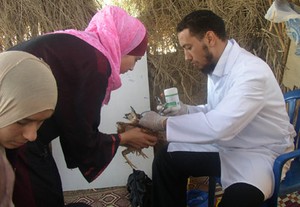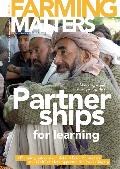Update from the field – Previous articles in this magazine have reported on the Fayoum Farmer Field School (FFS) project in Egypt. In March 2003, Jaap van der Pol showed how the Asian FFS-model needed adaptation in Egypt as local extensionists were used to working with individual farmers (not with groups) and to discussing rather than doing real-life experiments.
In September 2008 Hans Feijen reported how the Egyptian FFS started with a “neutral” agriculture agenda, and then slowly introduced urgent social issues. What’s the situation today?

According to Maaike van Hoeflaken, Team Leader of the Fayoum Farmer Field Schools project, most schools have now moved well beyond the original agricultural curriculum, and routinely start with a participatory needs assessment. While participants want to discuss all sorts of agronomical and livestock issues, they also want to talk about things like waste management in townships.
At least 60 percent of all field schools are mixed or for women only and, in such schools, health issues such as birth control or female circumcision are high on the agenda, even if they are culturally sensitive issues. Those in charge have contacted specialised organisations for their support in dealing with these issues.
Besides training farmers, networking with authorities has become an important part of the FFS curriculum. This is particularly effective when the requests are in line with government programmes.
For example, the government realises that the population in the region should not grow further because of water scarcity. An FFS that wants to discuss issues like family planning now finds it easier to access the services of a specialised government programme. But this relationship also works the other way round: when the government comes up with a specific programme, such as one to control avian flu, the FFS network provides a good vehicle to spread their message.
The National Rural Development Strategy says that rural development is about more than just agriculture. The ministries for health, education, and family and population have all approached the FFS network to make use of its outreach. Last May, Egypt’s First Lady, Suzanne Mubarak, visited the programme.
FFSs were included in the national extension policy and the government created a separate budget line for them. The Fayoum Agricultural Directorate has been appointed as the lead agency for spreading the methodology all over the country, for which it is creating a “FFS Centre of Excellence”. Five more governorates are planning to introduce a FFS programme – showing that farmer field schools are becoming institutionalised in Egypt.
Text: Frank van Schoubroeck
For more information, send an e-mail to Maaike van Hoeflaken: fayoumffs@gmail.com

